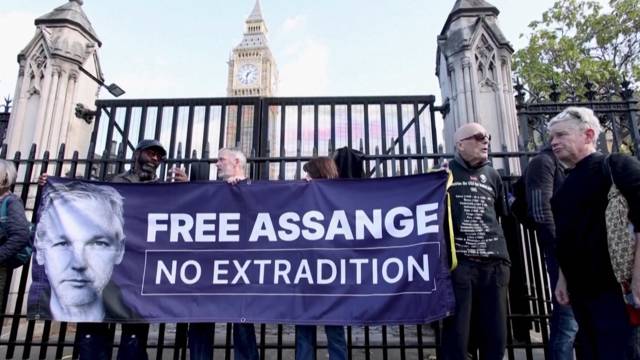
By Amy Goodman & Denis Moynihan
Australian Prime Minister Anthony Albanese said during Prime Minister’s Questions on February 15th, “This thing cannot just go on and on and on, indefinitely.” The Prime Minister was addressing an action he took a day earlier, on Valentine’s Day. No, not his marriage proposal to his partner, Jodie Haydon (she said yes). He was explaining his support for a parliamentary motion that passed overwhelmingly, calling for the release of an Australian citizen, imprisoned WikiLeaks founder Julian Assange. Albanese’s support builds on a growing demand from Australians across the political spectrum that the United Kingdom not extradite Assange to the United States, and for the US to drop its espionage and hacking charges against him. Assange, who has been imprisoned in London’s notorious maximum-security Belmarsh Prison since 2019, has a court hearing in the UK.
Assange’s counsel, Jennifer Robinson, texted us on Thursday,
“The appeal next week could be Julian’s final appeal against US extradition. If permission to appeal is denied, there are no further appeals available to us in the U.K.” If extradited, Assange faces up to 175 years in prison in the United States. Said Prime Minister Albanese, “Enough is enough.”
Prior to his imprisonment in Belmarsh, Julian Assange spent seven years cramped inside Ecuador’s small London embassy, where he’d been granted political asylum.
Assange founded Wikileaks, a website that publishes leaked material while protecting the identity of the whistleblowers. Launched in 2006, it wasn’t until 2010 that the US government forcefully and publicly targeted Wikileaks and Assange, after Wikileaks made several massive disclosures of leaked documents related to the US invasions and occupations of Iraq and Afghanistan.
On Monday, April 5th, 2010, Julian Assange released a shocking video at the National Press Club in Washington, DC. The video, which Wikileaks titled “Collateral Murder,” was shot in 2007 from a US military Apache helicopter flying over Baghdad, Iraq. The video shows in grainy black and white detail the gunship’s attack on a group of people on the ground. Twelve civilians, including two Reuters news employees, were mowed down by automatic fire from the helicopter. The voices of the crew were recorded, as they sought permission to “engage” with their targets, and as they laughed and cursed through the slaughter. It was a chilling video, documenting a war crime.
The video’s release was followed by the publication on Wikileaks.org of hundreds of thousands of digital records from the US military, dubbed the Iraq War Logs and the Afghan War Diary. These documents provided further proof that the US was committing war crimes. Some elected officials in the US called for Assange to be assassinated. Then-Vice President Joe Biden called him a “high-tech terrorist.”
Not long after, the U.S. Justice Department convened a secret grand jury which issued a sealed indictment against Assange. Existence of that indictment itself was revealed on Wikileaks, in a subsequent leak, in 2012. US and UK persecution of Assange since then has been continuous and severe. In 2017, as revealed in 2021 by journalist Michael Isikoff and colleagues, the CIA hatched plans to either kidnap Assange from the Ecuadorian embassy or even to assassinate him.
Andrew Wilkie, an independent Member of the Australian Parliament from Tasmania, introduced the resolution in support of Assange this week, saying, “This House notes that on 20 and 21 February 2024, the High Court of Justice in the United Kingdom will hold a hearing into whether Walkley Award-winning journalist Julian Assange can appeal against his extradition to the United States of America…both the Australian Government and Opposition have publicly stated that this matter has gone on for too long; and underlines the importance of the UK and USA bringing the matter to a close so that Mr Assange can return home to his family in Australia.”
The Australian government is not alone in calling for Assange’s release. In November, 2022, five major newspapers that collaborated with Wikileaks–The New York Times, the Guardian, Le Monde, El Pais and Der Spiegel–released a joint letter calling for an end to the prosecution. “Obtaining and disclosing sensitive information when necessary in the public interest is a core part of the daily work of journalists. If that work is criminalized, our public discourse and our democracies are made significantly weaker,” the letter read.
Assange’s attorney Jennifer Robinson will be in the London court for the hearing. She told us, “We have been saying for years: this is a political case which requires a political solution. The unprecedented showing of political support in the Australian Parliament overnight shows that Julian’s case is a priority for the Australian government, our parliament and the people. The US should listen to the concerns of its ally–and drop the case.”











Media Options